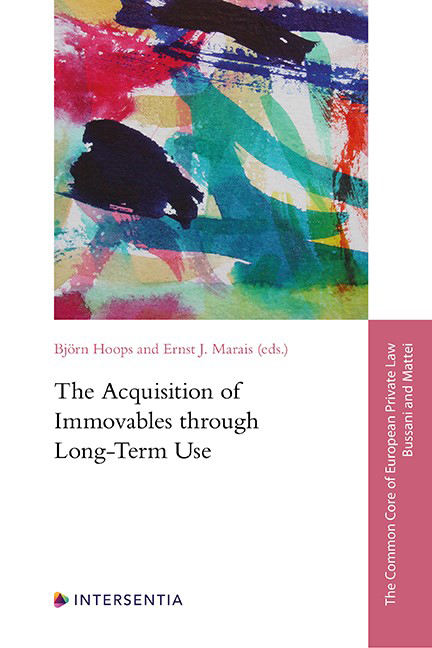Book contents
- Frontmatter
- General Editors’ Preface
- Preface
- Contents
- List of Cases
- Table of Legislation
- List of Abbreviations
- List of Contributors
- Case PART I INTRODUCTORY MATTERS
- PART II CASE STUDIES
- PART III GENERAL CONCLUSIONS
- Appendix I Instructions for the Project on the Acquisition of Immovables through Long-Term Use
- Index
Appendix I - Instructions for the Project on the Acquisition of Immovables through Long-Term Use
Published online by Cambridge University Press: 26 May 2022
- Frontmatter
- General Editors’ Preface
- Preface
- Contents
- List of Cases
- Table of Legislation
- List of Abbreviations
- List of Contributors
- Case PART I INTRODUCTORY MATTERS
- PART II CASE STUDIES
- PART III GENERAL CONCLUSIONS
- Appendix I Instructions for the Project on the Acquisition of Immovables through Long-Term Use
- Index
Summary
GENERAL GUIDELINES
STRUCTURE
– Give an outline of the applicable law at the beginning of the report, but discuss the rules in depth when they are applicable to the case.
– Make cross-references instead of reiterating what you have already explained.
SOURCES OF LAW AND SCOPE OF INVESTIGATION
– The most essential literature (whether foreign or domestic) should be indicated.
– References to sources (legislation, case law, scholarly writings, etc.) should remain in proportion to the importance of that source within the legal system.
– Please consider all areas of law relevant to the factual scenario, not just the obvious ones (i.e., law on acquisitive prescription/adverse possession), but also others, including tort law/law of delict, constitutional law, housing law, and other areas of private or public law.
– Information involving other systems in a comparison is welcome to the extent that it influences the outcome of the case in your jurisdiction.
– Assume that all cases are set in the year 2020.
– If the acting character has not acquired the land for the sole reason that s/he has not used the land long enough, please consider what would happen if s/he used the land for a longer period of time.
– Registered owner refers to the person who a land information system indicates as owner of registered land. The cases only concern unregistered land where the case makes express reference to unregistered land.
– Land information system refers to any system that contains information on the legal status of land and makes this information available to the public. Examples include public records of deeds and land registries. Discuss your land information system to the extent that it is necessary in order to understand your jurisdiction’s solution to the case.
WHEN ANALYSING THE SOURCES, PLEASE CONSIDER
– how the case would be solved (ejection, no ejection, retaining the right, loss of right, solution in between) according to legislation or case law in the given legal system;
– specifically with regard to the law on acquisitive prescription/adverse possession: the length of the prescription periods (with regard to good faith and bad faith control) and the reasons for it;
– whether this solution would be consistent with legal doctrine, legislation, constitutional jurisprudence, and supranational/international human rights treaties;
- Type
- Chapter
- Information
- The Acquisition of Immovables through Long-Term Use , pp. 713 - 720Publisher: IntersentiaPrint publication year: 2022



